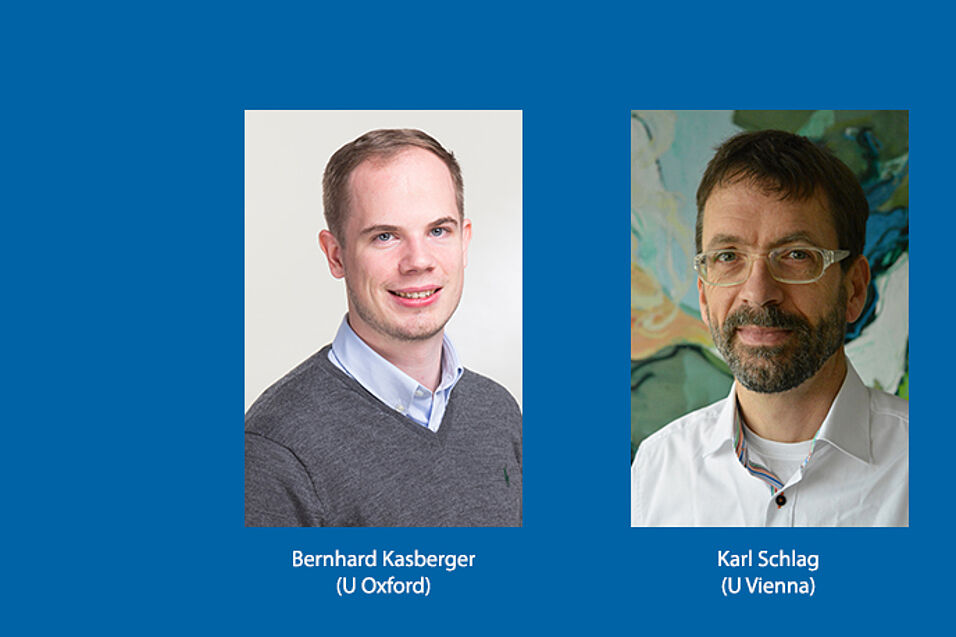Q: Today, the 2020 Nobel Prize in Economics was awarded to Paul Milgrom and Robert Wilson "for improvements to auction theory and inventions of new auction formats." Were you happy when you heard about the award?
B: Yes, I was very pleased, and I was looking forward to the award, to be honest. It was overdue in my view.
K: Why were you particularly happy about the field being auctions?
B: Auctions are my field of research. I have been working on auctions since the beginning of my Ph.D. studies.
K: Have you ever met one of the two laureates?
B: I met Paul Milgrom at the University of Zurich, where he taught a minicourse on market design in 2013. Three years later, Maarten Janssen and I organized an auctions workshop in Vienna, and we invited Paul to speak. To my great surprise, he accepted our invitation and really came to Vienna.
K: Did Paul Milgrom comment on your own research?
B: Yes, he saw me present my paper with Maarten Janssen on the combinatorial clock auction, which is now published in Theoretical Economics. He also saw my co-author Karl Schlag present our joint work on robust bidding in the first-price auction. I remember him saying that minimax regret may indeed be a fruitful method for analyzing auctions.
K: What is minimax regret about?
B: Minimax regret is a decision theory that is not the standard decision theory in game theory. What is cool about minimax regret is that it allows multiple priors, so it allows players to be really uncertain about the behavior of the other players. Our paper on robust bidding asks how one should bid if one has basically no clue how the others bid. This is a question standard game theory cannot address.
K: And more generally, what is auction theory actually about? Why do we need theory for auctions?
B: Auctions is a subfield of game theory. One of the characteristics of auctions is that players really know which game is being played. And also, we as analysts know which game is being played. This allows us to easily map our models into reality. We can then go back to theory when we realize that we've been missing important elements in our models.
K: The inventions of new auction formats was mentioned by the Nobel prize committee. Why do we need new auction formats?
B: I don't think we need new auction formats for selling a single good. But in many applications, we want to sell multiple related goods, and it is very challenging to do thisoptimally. There is no one-size-fits-all auction format for selling multiple goods. We need research to find out the strengths and weaknesses of certain auction formats, and then we can also come up with improvements.
K: What did the two laureates add to the creation of new auction formats?
B: Well, they really started the whole thing off. To the best of my knowledge, they were among the first game theorists to invent a practical multi-unit auction format. And their proposal is still in use in spectrum auctions.
K: Do we see that auction format every day?
B: We don't see it every day, but it is still somewhat the standard in the sale of spectrum licenses.
K: I guess you are really proud that your job market paper was mentioned in the official scientific background information on the prize. What is this paper about?
B: Efficiency was put forward as the major objective in spectrum auctions by Milgrom and Wilson. Efficiency means selling the licenses to the bidders who are willing to pay the most. Now, the bidders are firms, and they are willing to pay at most the future profits they can make with the licenses. So efficiency really means maximizing firms' profits. This can mean high prices for consumers of telecommunications firms. In the paper, I study a model to investigate this tradeoff between efficiency as defined by Milgrom and Wilson and the prices consumers have to pay.
K: Can I make money using your ideas?
B: Not with this paper.
K: But in general, is it part of the agenda to make money with this type of research?
B: Economists have certainly made a lot of money in advising bidders in these large spectrum auctions. The theories are indeed very practical. My paper that was mentioned by the Nobel prize committee seeks to help the regulators in designing these auctions for the public benefit, not to make money.
K: Have you ever bid in an auction?
B: As a high school student, I was very active on eBay for some time. Years later, I found out that my bidding behavior matched the one described in game-theoretic studies.
K: Thank you very much for this interview. Good luck with your research on auctions.
B: Thank you for the pleasant conversation.
Editorial comment: official background information on the prize is available athttps://www.nobelprize.org/uploads/2020/09/advanced-economicsciencesprize2020.pdf

